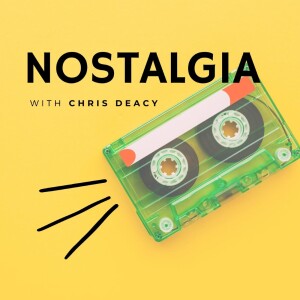
Nostalgia Interviews with Chris Deacy
Society & Culture

It was fantastic to catch up with Steve Jacobs, a retired Senior Lecturer in Media, Religion and Culture at the University of Wolverhampton, for my latest Nostalgia Interview. Steve and I were at Lampeter together from 1991-4 where we both received the same degree classification, and Steve recalls the way in which we received our results.
Steve worked in Religious Studies at Wolverhampton initially on a fixed term contract at a time when the subject was not well supported. We learn how he made the shift to Media, and his motivations for doing it, and how doing Chris Arthur’s Religion and the Media course at Lampeter helped him secure the job.
He speaks about the importance of Chris Arthur, my own PhD supervisor, who let Steve into the department at Lampeter back in 1991.
We learn about Steve’s doctorate in Hindu Reform Movements which he sees now as a training ground – a process rather than a definitive product. Steve reflects on how so much of process has been lost in Higher Education today, and we ruminate on what has changed in thirty years.
Steve talks about his background in catering and the Centre for Alternative Technology in Macynlleth where, prior to going to university, he ran their vegetarian kitchen. It was an educational centre whose objective was to promote sustainable living and Steve lived on site. Recently, Steve wrote a monograph on sustainable living at this Centre.
Steve discusses the choices he has made, and the importance of the concept of sharing – both in academia and in working in kitchens, and we learn about his move to ethnography.
Steve relates his experience of going to India, via Athens, in which he was able to study the practice and philosophy of yoga. He talks about the places that have really felt like home and about how home is a fluid construct.
Then, at the end of the interview, Steve relates how he has been able, by and large, to do the things he has wanted, and how growing up it was much more possible to live in the moment than is the case today. We talk about how student experiences can be different today, and Steve remembers the aerograms he used to send from India which his father kept.
Steve worked in Religious Studies at Wolverhampton initially on a fixed term contract at a time when the subject was not well supported. We learn how he made the shift to Media, and his motivations for doing it, and how doing Chris Arthur’s Religion and the Media course at Lampeter helped him secure the job.
He speaks about the importance of Chris Arthur, my own PhD supervisor, who let Steve into the department at Lampeter back in 1991.
We learn about Steve’s doctorate in Hindu Reform Movements which he sees now as a training ground – a process rather than a definitive product. Steve reflects on how so much of process has been lost in Higher Education today, and we ruminate on what has changed in thirty years.
Steve talks about his background in catering and the Centre for Alternative Technology in Macynlleth where, prior to going to university, he ran their vegetarian kitchen. It was an educational centre whose objective was to promote sustainable living and Steve lived on site. Recently, Steve wrote a monograph on sustainable living at this Centre.
Steve discusses the choices he has made, and the importance of the concept of sharing – both in academia and in working in kitchens, and we learn about his move to ethnography.
Steve relates his experience of going to India, via Athens, in which he was able to study the practice and philosophy of yoga. He talks about the places that have really felt like home and about how home is a fluid construct.
Then, at the end of the interview, Steve relates how he has been able, by and large, to do the things he has wanted, and how growing up it was much more possible to live in the moment than is the case today. We talk about how student experiences can be different today, and Steve remembers the aerograms he used to send from India which his father kept.
More Episodes
205: David Cloake
 2024-11-11
2024-11-11
 2024-11-11
2024-11-11
204: Max Barrett
 2024-11-01
2024-11-01
 2024-11-01
2024-11-01
203: Yvonne Howard
 2024-10-20
2024-10-20
 2024-10-20
2024-10-20
202: Nina Kuryata
 2024-10-07
2024-10-07
 2024-10-07
2024-10-07
201: Liù Batchelor
 2024-09-19
2024-09-19
 2024-09-19
2024-09-19
200: Christina Kim
 2024-09-01
2024-09-01
 2024-09-01
2024-09-01
199: Eleni Kapogianni
 2024-08-15
2024-08-15
 2024-08-15
2024-08-15
198: Gabriel Morris
 2024-07-27
2024-07-27
 2024-07-27
2024-07-27
197: Duncan Woodruff
 2024-06-24
2024-06-24
 2024-06-24
2024-06-24
196: Sofia Akin
 2024-06-08
2024-06-08
 2024-06-08
2024-06-08
195: Andy Richards
 2024-05-23
2024-05-23
 2024-05-23
2024-05-23
194: Abby Hook
 2024-05-07
2024-05-07
 2024-05-07
2024-05-07
193: Paul Badham
 2024-04-23
2024-04-23
 2024-04-23
2024-04-23
192: Henrik Schoenefeldt
 2024-04-15
2024-04-15
 2024-04-15
2024-04-15
191: Sabrina Mei-Li Smith
 2024-04-07
2024-04-07
 2024-04-07
2024-04-07
190: Sally Bernard
 2024-03-26
2024-03-26
 2024-03-26
2024-03-26
189: Sally Nicholls
 2024-03-11
2024-03-11
 2024-03-11
2024-03-11
188: Safeer Khan
 2024-02-19
2024-02-19
 2024-02-19
2024-02-19
187: Simon Smith
 2024-02-06
2024-02-06
 2024-02-06
2024-02-06
186: Louise Naylor
 2024-01-17
2024-01-17
 2024-01-17
2024-01-17
012345678910111213141516171819
Create your
podcast in
minutes
- Full-featured podcast site
- Unlimited storage and bandwidth
- Comprehensive podcast stats
- Distribute to Apple Podcasts, Spotify, and more
- Make money with your podcast
It is Free
- Privacy Policy
- Cookie Policy
- Terms of Use
- Consent Preferences
- Copyright © 2015-2024 Podbean.com





